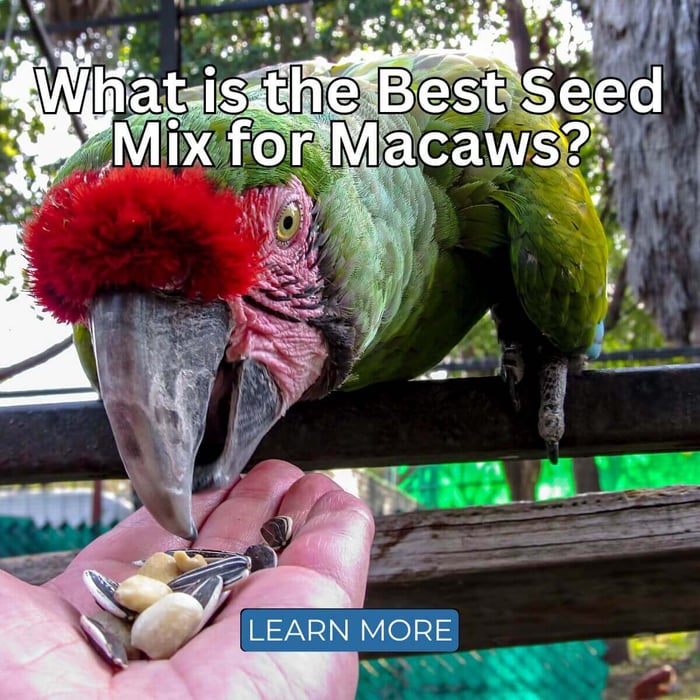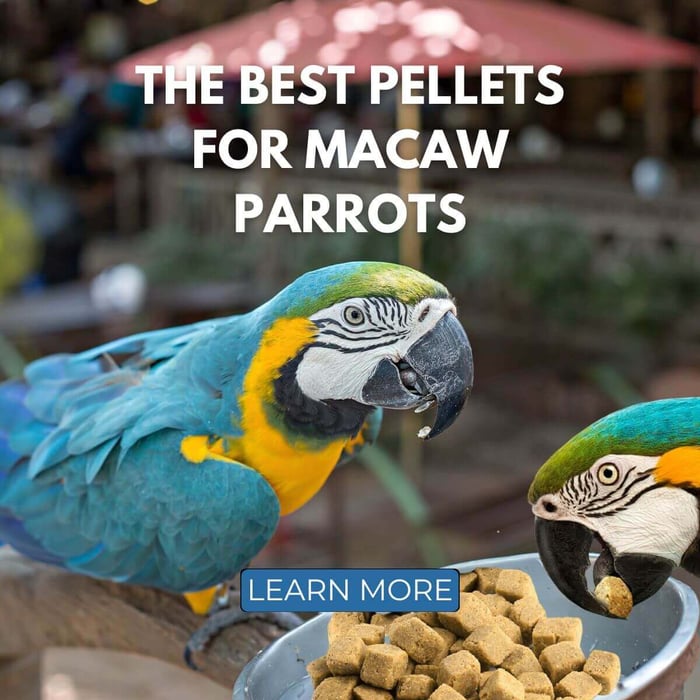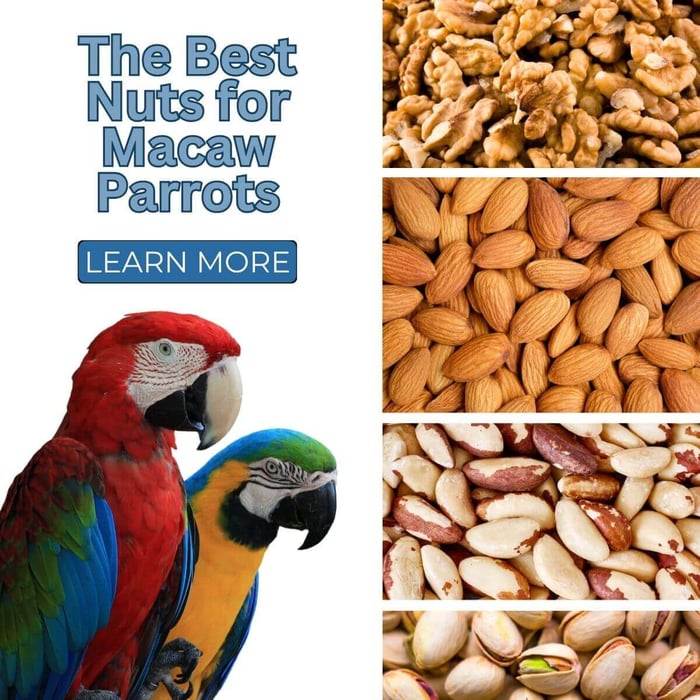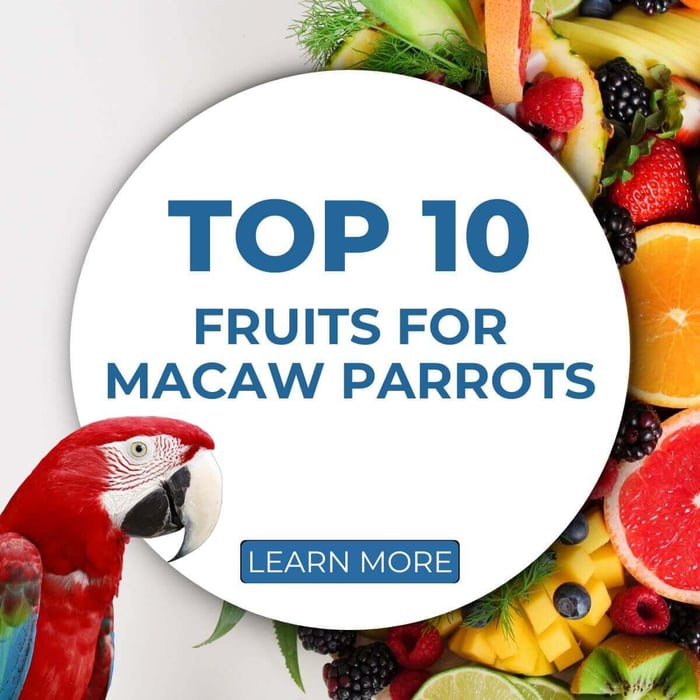Best Treats for Macaw Parrots: What Your Feathered Friend Will Love
Macaws are among the most intelligent and charismatic of all parrot species. Their striking colours, playful personalities, and boundless energy make them wonderful companions but also demanding ones. To keep your Macaw happy and healthy, a varied and stimulating diet is essential. While pellets, vegetables, and some fruit form the basis of good nutrition, treats for Macaw parrots offer something extra: a chance to bond, train, and entertain your feathered friend.
But which treats are actually good for them? And how much is too much? Let's explore the healthiest and most engaging treat options for Macaws.
Nature's Favourite: Nuts
Macaws are natural nut lovers. In the wild, they forage for a variety of nuts, and their strong beaks are built to crack through tough shells. Nuts are high in healthy fats, protein, and essential minerals like magnesium and selenium, making them a nutritious and highly appealing treat.
Some of the best nut treats for Macaws include:
- Almonds (in shell) – great for mental stimulation as well as nutrition
- Walnuts – contain omega-3 fatty acids for brain and feather health
- Brazil nuts – rich in selenium, which supports immune function
- Macadamia nuts – a fatty but irresistible indulgence, best offered sparingly
- Pecans – a softer option, ideal for older birds or those not keen on hard shells
Offer nuts as a reward during training or hide them inside foraging toys to turn snack time into a stimulating game.
Due to their high-fat content, stick to a few nuts per day—used sparingly; they'll keep your Macaw healthy and excited for the next bite.
Fruity Delights
Fruit treats are colourful, sweet, and full of natural vitamins. Macaws especially enjoy juicy and tropical fruits, which mirror what they might forage for in the wild. The natural sugars in fruit are fine in small amounts and can be an excellent high-reward treat during recall training or trick sessions.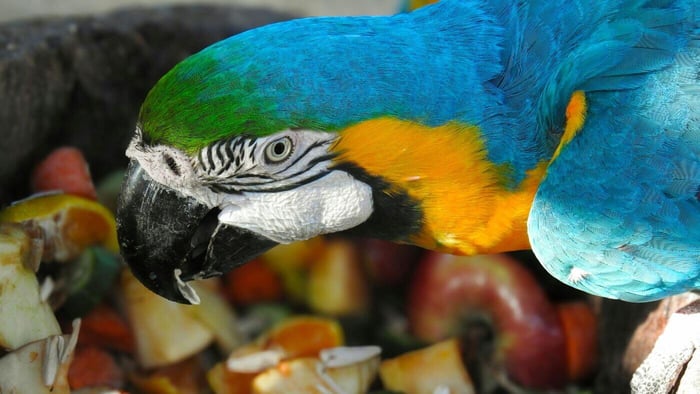
Favourites include:
- Mango (fresh or dried – no added sugar) – a soft, vitamin-rich treat full of beta-carotene
- Papaya – helps support digestion and is packed with antioxidants
- Banana chips (unsweetened) – crunchy and full of potassium
- Berries – rich in vitamin C and antioxidants; plus, Macaws love their colour and burst of flavour
- Apple slices – a crunchy favourite, but be sure to remove all seeds as they contain traces of cyanide
Mix a few fruit pieces into their regular food or offer them on a skewer toy for extra fun.
Avoid sulphur-dioxide-preserved fruits, sweetened dried fruit, or fruit mixes meant for humans—these often contain additives not suitable for parrots.
Parrot-Safe Baked Treats
For Macaws who like a good crunch, baked parrot treats are a great choice. These treats are specially formulated for birds and often combine healthy ingredients like grains, herbs, fruits, and vegetables in a biscuit or bar form. They provide texture variety, are shelf-stable, and satisfy a Macaw's urge to chew.
Popular choices include:
- Bird treat bars or sticks – often coated in fruit, seed, or herb mixtures for added interest
- Natural bird cookies – bite-sized and easy to offer by hand or in foraging trays
- Sweet Potato Balls – Homemade recipes like these can make it easier to get reluctant parrots used to eating their veg.
Break baked treats into smaller chunks and use them during training, especially for larger birds like Blue and Golds or Green-winged Macaws that need more motivation.
Even natural baked treats can be calorie-dense, so use sparingly—once or twice a week is ideal.
Veggie Treats They'll Crunch For
Vegetables are often overlooked as treats, but many Macaws love the crunch and earthy sweetness of certain veg. They're low in sugar and high in fibre, vitamins, and minerals—making them the ideal healthy snack.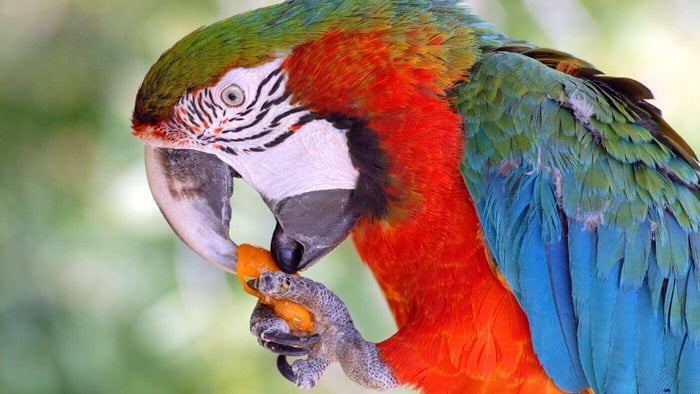
Try offering:
- Green beans – fun to chew and high in vitamin K
- Sweetcorn rounds – rich in natural sugars and offer a satisfying crunch
- Carrot sticks – provide beta-carotene and are good for beak wear
- Cooked squash or sweet potato cubes – soft and sweet, ideal for stuffing into foraging toys or skewers
Lightly steam harder vegetables if your Macaw prefers softer textures, or freeze-dry them to maintain crunch and nutrients.
Use bird-safe skewers to hang chunks of veg inside the cage, encouraging natural foraging behaviour.
Treats That Encourage Foraging
Macaws are clever and curious birds. In the wild, they spend hours every day foraging for food, solving problems, and playing with their environment. Foraging treats not only satisfy their taste buds—they also fulfil a deep-rooted instinct for exploration and problem-solving.
Enrichment-based treat ideas:
- Nuts or dried fruit hidden inside cardboard boxes or paper rolls
- Foraging toys with compartments or spinning elements that must be opened to access the reward
- Natural coconut shells stuffed with treats and chewables
- Treat puzzles or shreddable boxes with multiple layers
Rotate foraging toys weekly and change up the treats to keep the experience fresh and mentally stimulating.
Foraging reduces boredom, which can help prevent behavioural issues like screaming or feather plucking.
Treats to Avoid
Not everything that tastes good to humans is safe for parrots. Some common foods are toxic to birds and should never be offered as treats, no matter how curious or persuasive your Macaw may be.
Avoid:
- Chocolate, caffeine, alcohol
- Avocado (toxic to birds)
- Onion, garlic, or leeks
- Chips, biscuits, sweets, and processed snacks
- Dairy products (birds can't digest lactose)
- Human cereals, breads, and nut butters with added salt or sugar
When choosing treats for Macaws, simplicity is best. If you wouldn't find it in nature, it probably doesn't belong in your bird's treat bowl.
How Often Should You Give Treats?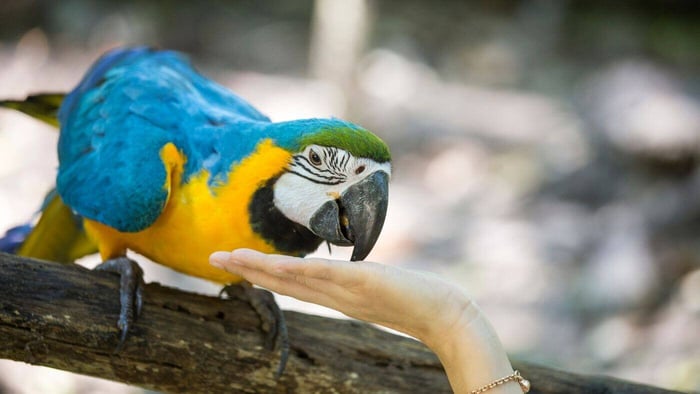
As tempting as it is to spoil your Macaw, treats should only make up 5 to 10% of their total diet. The rest should come from a carefully balanced mix of high-quality pellets, sprouts, and some fresh produce. Think of treats as a special bonus, not a regular part of every meal.
Offer treats during:
- Training sessions
- Interactive playtime
- Foraging games
- Bonding moments
This helps reinforce positive behaviour and keeps your Macaw's life full of variety and fun.
Final Thoughts
Finding the right treats for Macaw parrots is about more than indulgence—it's a way to enrich their environment, keep them mentally sharp, and show your love. Whether it's a walnut hidden in a toy, a crunchy veggie skewer, or a hand-fed slice of mango, the best treats are those that engage their senses and support their well-being.
Ready to stock up on healthy, bird-safe goodies?
Visit Parrot Essentials' Macaw Treat Collection and treat your feathered friend to something truly special.
FAQs
What are the best treats for Macaws?
Macaws enjoy nuts (like almonds and walnuts), tropical fruits (such as mango and papaya), baked bird treats, and crunchy vegetables like carrots and green beans.
How often should I give my Macaw treats?
Treats should make up no more than 5–10% of their total diet. Offer them during training, playtime, or foraging games to keep things balanced and fun.
Are all nuts safe for Macaws?
Most unsalted, raw nuts are safe, including almonds, walnuts, and Brazil nuts. Avoid flavoured or salted nuts, and feed fatty ones like macadamias in moderation.
Can I give my Macaw dried fruit?
Yes, but only if it’s unsweetened and free from preservatives like sulphur dioxide. Always check the ingredients before offering dried fruit.
Are baked parrot treats healthy?
Yes, when specially made for birds. Choose treats with natural ingredients and offer them in moderation—about once or twice a week.

